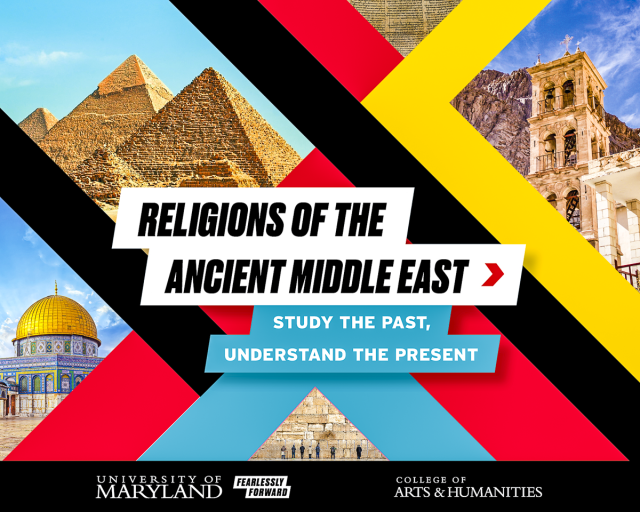Bachelor of Arts in Religions of the Ancient Middle East
Study the past, understand the present.
THE BACHELOR OF ARTS IN RELIGIONS OF THE ANCIENT MIDDLE EAST delves into the roots of biblical Israel and ancient Judaism, Christianity and early Islam, along with Greek and Roman mythology and the ancient Near East. Majors expand their cultural competence and understanding of social and political issues that are still unfolding. Students tackle key religious questions and develop transferable skills that prepare them for careers in leadership, policy, research, education and more.
ABOUT THE CENTER
The Joseph and Rebecca Meyerhoff Program and Center for Jewish Studies at the University of Maryland is a small community where students receive individualized attention. The center is also home to the Joseph and Alma Gildenhorn Institute for Israel Studies. Courses are offered in Jewish studies, other religious studies, the Middle East, Israel studies and more. Faculty expertise spans the Late Bronze Age to the present, with interdisciplinary specializations including history, film and philosophy. Students are welcomed into a culture of intellectual exploration and communal involvement.
COURSEWORK
Religions of the ancient Middle East coursework explores the religious and cultural beliefs, practices and institutions that flourished in the ancient Mediterranean and Near East. Courses in art history, classics, Jewish studies and religious studies address the nature of religion, religious change and the interplay of diverse religious groups. The optional language track offers language-enhanced options, encouraging majors to learn Arabic, Hebrew or Greek and apply it to research. Students can tailor the major to suit their interests, study abroad and take advantage of local internship opportunities in Baltimore and D.C.
Career Readiness
The College of Arts and Humanities (ARHU) offers courses designed to ensure students are ready to enter the workforce, along with integrated and individualized academic and career advising. Alumni continue on to graduate school or forge their careers in a variety of industries and fields. The creative ways to apply your ARHU degree are truly limitless! Here are some placements specific to religion majors:
Internship Placements
- Foundation for Jewish Camp
- RumbleUp (messaging platform)
- University of Maryland
Graduate School Placements
- University of Chicago
- University of Pennsylvania
- Utah State University
Employer Placements
- AmeriCorps
- Glenstone Museum
- Independence Behavior Solutions
- OMNIKA Foundation (mythology search engine)
- U.S. Marine Corps
The major in religions of the ancient Middle East (RAME) offers students the opportunity to explore the world out of which biblical Israel and ancient Judaism, Christianity and early Islam emerged, as well as the wide array of other religious and cultural beliefs, practices and institutions that flourished between about 1200 BCE/BC and 850 CE/AD. In foundations courses, students take at least one course that addresses a significant question about the nature of religion and religious change or the interplay of religious groups. In addition they must take two courses that survey two geographical, cultural or chronological sub areas. In addition to electives, all students take an interdisciplinary capstone seminar, typically in their final year.
Language Track (min. 36 cr). Although there are no language requirements for the major, students who wish to incorporate ancient languages into their work are encouraged to pursue a language enhanced track. Students take six credits of language at the second year level as part of their major. They are also expected to make use of their target languages in completing the research project for the capstone course.
The university currently offers Arabic, Hebrew and Greek. The number of credits per course varies by language. Other languages such as Aramaic, Akkadian or Syriac taken through CourseShare or the Consortium of Universities of the Washington Metropolitan Area may be substituted.
Note: Students pursuing the language track may need to take up to 12 credits in language prerequisites to attain the second year level.
Requirements for the Major
Note that lower-level courses are at the 100- and 200- levels and upper-level courses at the 300- and 400-levels. Courses at the 600-, 700- and 800-levels are reserved for graduate students.
- One approved I-series course
- RELS289I: “What is Religion?”
- RELS289M: “Jesus, Mani, and Muhammad”
- JWST274: “Jerusalem in Antiquity: The History of Sacred Space in a Holy City”
- Three courses in two or more geographical, chronological, or cultural sub-area
- HIST120: “Islamic Civilization”
- RELS264: “Introduction to the New Testament”
- JWST225: “Religions of the Ancient Near East”
- JWST231: “Jewish Texts and Cultures of the Second Temple Period”
- JWST262: “Introduction to the Hebrew Bible/Old Testament”
- Five Electives (four must be at the upper level)*
- CLAS305: “Archaeological Methods and Practice”
- HIST110: “The Ancient World”
- HIST320: “Early Christianity: Jesus to Constantine”
- HIST428: “Selected Topics in History” (HIST428R: “Transition to Islam: From the Ancient to the Medieval Muslim World”)
- JWST324: “Biblical History and Culture”
- JWST325: “Jews and Judaism in Antiquity I: Sixth Century BCE through the First Century CE”
- JWST326: “Jews and Judaism in Antiquity II: First through Seventh Centuries”
- JWST430: “Dead Sea Scrolls”
- JWST468: “Readings in the Hebrew Bible”
- JWST469: “Readings in Rabbinic Hebrew”
- * Other courses by permission
- Capstone (RELS408)
Advising
Making an Appointment
Students enrolled in the religions and cultures of the ancient Middle East major are advised on two tracks. They must meet with their College of Arts and Humanities advisor:
- before or during their first semester
- when they declare a major in ARHU
- when they complete 45-55 credits
- when they complete 90-100 credits
In addition, religions and cultures of the ancient Middle East majors have mandatory advising every semester. (Students with an additional major will have additional advising requirements depending on the major and/or college of the additional major.) You can reach Religious Studies Advisor Maxine Grossman by calling 301-405-4980, or at mgrossma@umd.edu.
What to expect from advising
Students who wish to major in religions and cultures of the ancient Middle East should expect to meet with the religious studies advisor each and every semester. During these meetings, the advisor will chart a student’s progress through the major. The kinds of questions that the advisor will ask include: “What courses are you taking,” “What courses do you intend to take?,” “Are you interested in studying abroad?,” and “How are you doing in your classes?”
The advisor will make notes and go through the Major Advising Form to ensure that the student understands the major’s requirements, what courses to take and when to take them. Every student will get a copy of his or her Major Advising Form at the end of each meeting for his or her own records.
Note that students who have not yet declared Jewish studies as their major must meet with the Jewish studies advisor and then meet with an ARHU advisor. During this first meeting with the Jewish studies advisor, the student will learn about the Four-Year Plan, which is a schedule of classes developed by ARHU and Jewish studies for the typical Jewish studies major to follow. It outlines which courses should be taken during which semesters.
What to bring to an advising meeting
When students come to a meeting with the religious studies advisor, they should bring a list of courses they are thinking about taking, as well as any other requirements they need to fulfill for another major or minor.
Other documents, such as the requirements for another major or minor, descriptions of courses taken abroad and previous Major or Minor Advising Forms, are also helpful to bring.
BOLDLY HUMAN FEARLESSLY CREATIVE
ABOUT THE COLLEGE
When you join the University of Maryland College of Arts and Humanities (ARHU), you become part of a supportive and inclusive community committed to solving the world’s grand challenges. ARHU is reimagining an education in the arts and humanities by empowering students to make sense of the world using empathy, creativity and intellectual rigor. Our faculty and staff experts are focused on preparing competitive, versatile and visionary leaders equipped to address the complexities of the human experience. Graduates are purposefully prepared for successful careers and fulfilling lives.




